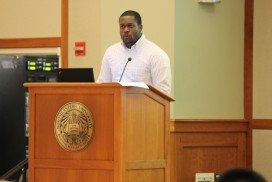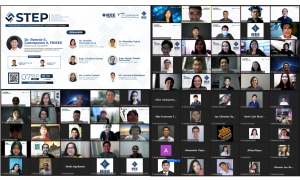By now, Barack Obama is well into his second term in office as President of the United States. However, there were moments when the outcome of the election was not so certain. For electrical engineers and energy-conscious voters, issues leading up to the election included power consumption, renewable energy development, and national energy independence.In mid-October of 2012 the IEEE GOLD Boston Section co-sponsored a STEP event held at Northeastern University (NU) in Boston, Massachusetts entitled “Energy Policy – Innovating a way to a clean energy future or a rapid development of domestic reserves.” The distinguished lecture and social event was jointly held with the Boston chapter of the IEEE Power & Energy Society (PES), and the NU PES student branch. The widespread interest surrounding the upcoming United States presidential election led to a big turnout for the technical meeting. The audience was mainly composed of undergraduate and graduate engineering students, mixed with faculty and professional IEEE members. This event was also open to non-members of the IEEE, and it sparked the interest of non-STEM majors at the university that were following the race for the White House.The premise was that the two presidential candidates had substantially different ideas about how the United States of America could secure its energy future, create jobs, and reinvigorate the economy. Audience members were free to ask questions and discuss any related topics with the speaker, Clarke Bruno, during the presentation. Clarke Bruno currently oversees Anbaric Transmission’s legal affairs and projects in the Mid-Atlantic region. Recently he was appointed chair of the NYC Bar Association’s energy committee for 2012-2015. Previously, during Mayor Bloomberg’s first term in New York City, he helped win dismissal of four major lawsuits that hobbled the City’s operations.

Image credit: Mert Korkali, IEEE PES NU Treasurer
Overall, the goal of the presentation was to provide an accurate portrayal of both the Democratic and Republican candidates’ energy plans that were made public. Bruno highlighted several areas where each of the candidates differentiated themselves in their energy policy proposals, such as coal and wind power. Each renewable and fossil fuel plan was compared in a bipartisan way was that was very informative to undecided voters with strong interests in energy consumption. One of the few similarities between the two candidates was the promise of energy independence, though how each intended to acheive that was a different story.
During the discussion, Mr. Bruno took an in-depth non-partisan look at the manifestos of both Mitt Romney and Barack Obama to compare and contrast their energy policies, and discuss the possible implications of each plan for the future. The sources used to compare the policies of each candidate included information on their websites at the time and other information made public by their respective staff. The speaker also attended a debate held at the Massachusetts Institute of Technology (MIT) between top-level affiliates representing the views of both Romney and Obama.
Calvin Zhang concluded the lecture and introduced me to speak on the benefits of membership in IEEE GOLD. For most students, the transition starts after partaking at the student branch level. However, some of members in the audience did not have that opportunity so I gave an overview of the several dozen IEEE societies that exist, therefore, no matter the area of expertise or discipline, you can find a society that suits your interest.
We wish to thank all of the organizing members of Boston’s IEEE PES and GOLD Sections for making this event possible.
Article contributed by Jean M. Blanc, IEEE Boston Section Membership Development Co-Chair



